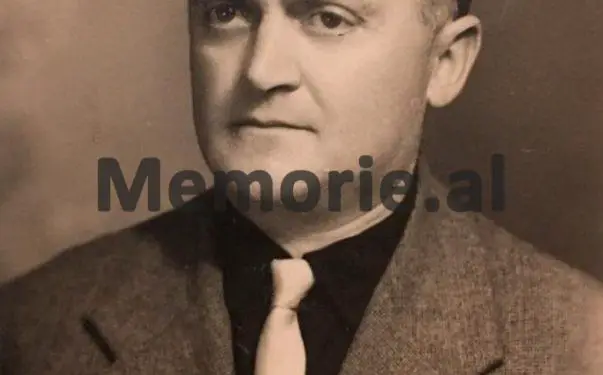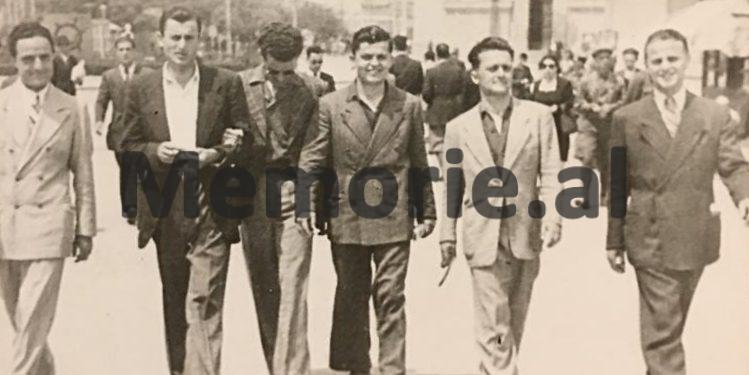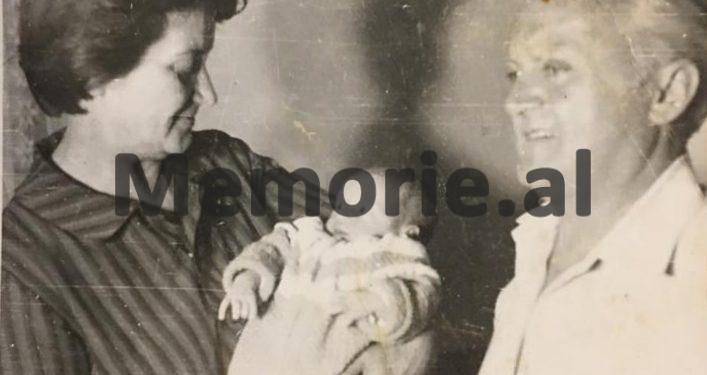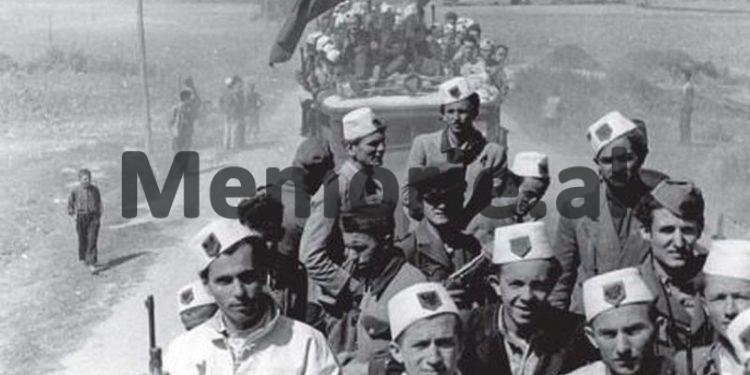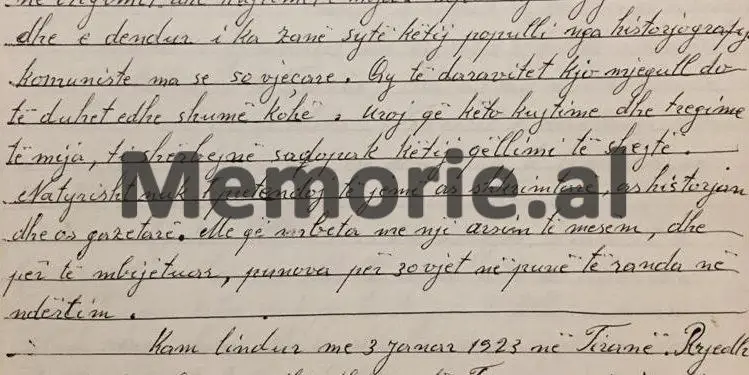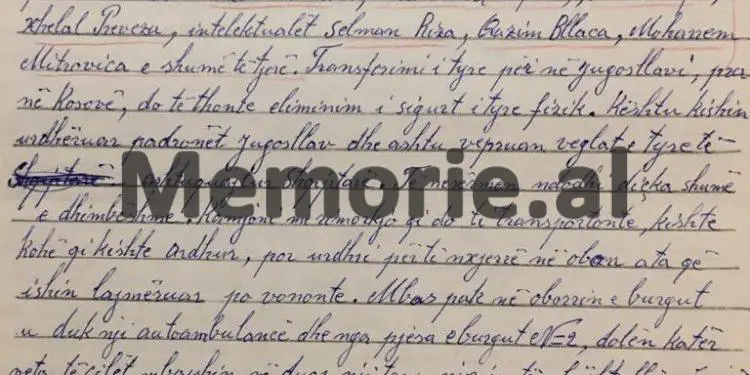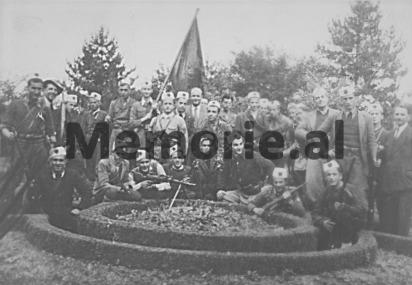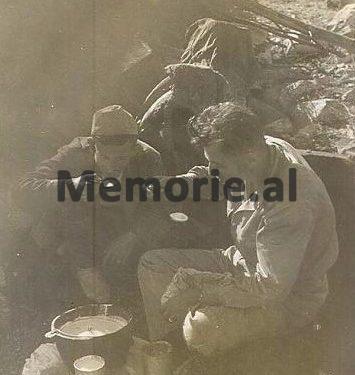Dashnor Kaloçi
Memorie.al publishes the unknown testimonies of Xhemal Alimehmeti, former senior exponent of the National Front during the War, who was arrested immediately in the first days of January ’45, and was sent to serve his sentence in the Old Prison of Tirana, “Mine Peza”, where at that time were arrested a large number of intellectuals, ministers, military, prominent politicians and senior officials of the Albanian government since the time of Ismail Qemali and after, as : Fejzi Alizoti, Terenc Toçi, Aqif Përmeti, Gustav Mirdash, Koço Kota, Hilmi Leka, Reshit Valteri, Javer Hurshiti, Dik Cami, Ismail Golemi, Zef Kadarja, Tahsim Bishqemi, Shyqëri Borshi, Daut Çarçani, Kole Tromara, Bah Vrioni, Mihal Sherko, Rrok Gera, Tefik Mborja, Sokrat Dodëbiba, Mihal Zallari, Ndoc Naraçi, etc., who ended up in the Special Court. Alimehmet’s stories about foreign nationals being held in isolation in that prison, such as: Italians, Germans, white Russians, Hungarians, Poles, Greeks, Yugoslavs, etc., and the German military with the rank of colonel who often took him to the Ministry of Foreign Affairs Interior where he deposited…
In the old prison of Tirana at “Mine Peza” street, I had the church and Bahri Omari and Kol Tromara, both personalities and people with great reputation in Albanian politics since the early 1920s. I remember that from February 1945, Bahri was met by his wife, who was Enver Hoxha’s sister, accompanied by Nexhmija, who had just married Enver. At the meeting room, the shepherd’s wife introduced him to Nexhmija, telling him that she was Enver’s bride, and took out some small gifts from the bag she had with her, which the newlywed couple, according to Gjirokastra customs, had given to Bahri. “Bahri did not want to take them, but his friend Kole Tromara insisted that he should not return them to you.” This is how Xhemal Alimehmeti, the former main exhibitors of the Nationalist Youth of the National Front during the Anti-Fascist War, recalled that unusual event that took place in the old prison of Tirana 75 years ago (in the beginning of February 1945). who was one of the political prisoners held there. Alimehmeti, who was arrested when the communists came to power in December 1944 and served several years in Tirana prison cells, in the testimonies he gave us shortly before he passed away, told about Nexhmije’s visit. Hoxha in the Tirana prison where she had gone with Enver’s sister and at the same time Bahri Omar’s wife, who was arrested in that prison. Also, for this event, Mr. Alimehmeti also wrote in his memoirs (with his writing), which he gave us shortly before he passed away, where among the many stories and events dating from 1939 onwards throughout the War period, he wrote even for the mysteries of that infamous prison, where the communist regime in power eliminated many of its political opponents. Like: well-known intellectuals, ministers, deputies, politicians and senior military who had served in various governments of the Albanian state from the time of Ismail Qemali to that of Colonel Fiqëri Dines under German occupation, as well as many German foreign nationals., Italian, Hungarian, Polish, white Russian etc. But in this article, we will focus only on the interview we had with Mr. Alimehmeti, for the period when he was in the Old Prison of Tirana (“Mine Peza”) as well as some other events that took place in the last days of the War.
Mr. Alimehmeti, first can you tell us something briefly about yourself…?
I was born in the city of Tirana in 1923, where my family comes from. My father, Hyseni, or as he was otherwise known, Ceni, was a well-known manufactory trader and we lived on Barrikadave Street, in a house that was later seized by the communist regime and used as Befotrof until 1990. -të.
Where were you educated?
I graduated from the high school in Tirana in 1943 and as classmates I had some of the well-known names of the War and then of the communist state, such as: Manush Alimani, Siri Kodra, Ibrahim Uruçi, Skënder Begeja, Muhamer Spahiu, Prokop Murra and Ramiz Ali who also became President of Albania. From the high school benches, I sympathized with nationalist ideas and then took an active part with the youth of Balli Kombëtar, joining the youth battalion “Besnik Çano”, which in the summer of 1944, I fought until Kosovo.
Under what circumstances did your arrest take place and why were you charged?
Even before the end of the war, in the last days of October and the beginning of November 1944, the communists and their partisan brigades stationed in the suburbs of Tirana began arresting their political opponents, whom they considered as “criminal”, “traitors and enemies of the people”. Seeing the situation in Tirana, where the communists began arrests and extrajudicial shootings, at the end of November 1944, I hid in the house of my uncle, Bim Keçi. Given that on November 28, 1944, at the large rally held in front of the hotel “Dajti”, where partisans celebrated the day of liberation of the country, the head of the provisional government, Colonel-General Enver Hoxha, in his speech announced an amnesty. For all those who had not stained their hands with blood and committed crimes, I thought of going out and not hiding anymore. Considering myself as one of those people who should have benefited from that amnesty, I talked to my uncle, Bim Keçi, who went to meet Beqir Balluku, whom he had a close friend. Uncle Bimi went to Beqiri to ask if I was benefiting from that amnesty and said: “Xhemali has not crossed the Adriatic like many of his friends.”
How did beqir Balluku answer?
Beqiri told Bim that he did not know anything about the amnesty, as he had been in the mountains and that he would give the answer the next day, after looking at the documents for those who were considered “war criminals”.
Did he give her the answer?
When Uncle Bimi went the next day to get the answer, Beqiri told him: “Xhemali should come out and not stay hidden, because they will take him badly and will look for him”. Based on this, the next day I went out on the boulevard and while I was walking with my friend, Rexhep Spahiu (later a national team player), a young boy who was a neighborhood activist came up to me and told me that I should go after him. at Command, where I was asked for an explanation.
Did you go there?
Of course, when I went there, I found Xhavit Qesen and Ismail Çaushi, who I knew and knew, and after some questions they escorted me to the Directorate of People’s Defense, (at Selvija) where Zija Kambo and the first captain Mihallaq Zishishti were in command.
What were they told there?
In the Directorate of People’s Defense (Selvija) which was a terrible place, as hundreds of people were tortured there (many of whom did not leave alive), Captain Mihallaq Ziçishti pressured me, directing me twice revolver in the head. After three days, they took me out into the basement corridor and together with three others, tied us two by two and in the dark, accompanied by five armed guards, took us to the old prison in Tirana.
Who did you associate with, remember?
I was linked to Muhamer Liço, a lawyer, and the other two were Zenel Bejko, an elderly villager from Libohova, and Nuredin Çabej, a young man from Gjirokastra. While so connected we were walking towards the road that today is called “Siri Kodra”, lawyer Liço asked me: “Are they taking us to the River Bank”?! I immediately understood the lawyer’s question, that since that time the River Bank became the place of shooting of many misfortunes that the communists called traitors and criminals, and that bad luck had lawyer Liço, but not there, he was sent in Korça and there he was shot.
You said above that the communists started the arrests and shootings before Tirana was liberated. More specifically what do you know about this?
Yes, this is very true. Beginning in late October and early November 1944, in addition to hundreds of detainees, in Tirana, communist-led partisan units shot dozens of people without trial. It happened that many of them were shot in the backyards, in front of family members. Thus, before the end of the War, in the basements of the Bristol Hotel, a mass grave was found where they had been shot without trial, and barbarically a large number of citizens, most of whom were well-known intellectuals from the period of the Monarchy of the bird and then.
Specifically, who is it about?
Yes, the journalist and publicist Nebi Çika, Aleks Mavraqi, the brothers Syrja and Vesim Kokolari, Ismail Petrela etc. Intellectuals were also shot in those days: Ali Panariti, Anton Fekeçi, Jakup Deliallisi, Montaz Kokolari, Profesor Çoka, Akil Sakiqi, Lluka Xhumari and the military Boris Beleski, Nazmi Uruçi, Hamit Greblleshi, Abdulla Saraçi, Sybi Topalli, R Muharrem Kalenja, etc.
Remember other names?
Yes, I remember the shooting of Captain Petraq Pekmezi in the backyard of his house on the shores of Lana near the “Ali Demi” neighborhood, who had served as a translator for the German Gestapo. In October 1944, Pekmezi had mediated between Enver Hoxha’s partisan headquarters and the Germans for the exchange of three Nazi girls with ten communists in the Pristina camp. Pekmez was shot because he was the only witness who was aware of the agreement broken by Enver Hoxha, which led to the shooting of 105 interned Albanians in the Pristina camp.
Is it true that partisan forces had arrested and detained many of their political opponents without ending the War?
More real. The first prison the communists opened for their political opponents was a military barracks on Mount Dajti that was opened by partisans before the end of the war. I know that there in that prison among dozens of others, was also Prokop Mima, who later became a great actor.
Where did they take the detainees afterwards?
From the beginning of December 1944, all those prisoners were transferred to the Old Prison of Tirana.
Under what conditions were they kept in that prison? Who was his commander?
Of course, the living conditions of that prison were miserable, but for the sake of truth, it must be said that in the first years after the war, we were allowed any kind of food brought to us by family and meetings with relatives. Perhaps this was conditioned by the fact that at that time in Albania were still representatives of some Western countries and the Albanian government led by Enver Hoxha sought to be recognized by those countries.
Who was his commander?
As far as I remember initially, the commander of the Old Prison was Aristidh Qëndro, originally from Korça. He was a young boy in his 40s, tall and a little brunette. I knew that man from the first day he was taken to that prison, because his human behavior impressed me a lot. My biggest surprise was that after three or four weeks he and the (director) were brought to our cells as detainees, after they had disarmed him before.
What was he arrested for?
Aristidhi had been with the Communist Group of Korça and close friends of Zai Fundos, in that faction that Enver Hoxha called “Trotskyists”.
What happened next to Aristidh Qëndron?
“I remember that one winter night in 1946, the head of the prison guards shouted loudly in the corridor two names: Ndrekë Kodhelin (English translator during the Monarchy) and Aristidh Qëndron. He informed them that they were getting ready to be transferred to Burrel prison, which was getting ready to receive many of the political prisoners who had overcrowded Tirana prisons. In that prison, Ndreka and Aristidhi never arrived, because as we later learned from some senior soldiers who ended up in our cells as prisoners, by direct order of Enver Hoxha, they were shot on the street on the pretext that they wanted to escape.
Who were the people who “populated” that prison?
At that time, the political prison of Tirana was a mosaic of nations and peoples, as there were German, Italian, Polish, Hungarian, white Russian, etc. citizens. From the Germans stood out a colonel who during the war had served as Governor of Corfu, who had been captured by Greek partisans and handed over to the Albanians.
What about others do you remember?
Yes, one of the German captains was called Helmut Mutte. He was a tall man about 35 years old, who spoke several languages. As a special agent of the Gestapo, he had served in the Allied rear during the War. This man was often called to the offices of the Ministry of Interior, but no one, not even his friends, found out the truth why they called him there.
Was the truth of his “visits” to the Ministry of Interior learned?
It was later learned that the Albanian State Security had processed him and obtained a statement in which he testified that: The Anglo-American Allied Missions that had come to help the partisan war in Albania, had secret meetings with the German command.
Why this statement, who would it serve?!
This statement was used until the UN, by representatives of the Eastern Bloc, especially by the Soviets and Yugoslavs. He was also mentioned by Enver Hoxha at the First Congress of the Albanian Communist Party. Along with the colonel were two or three captains and three soldiers.
Besides foreigners, who do you remember from that prison?
Apart from the foreigners, the rest who made up the majority of the prisoners who were there, were former senior officials of previous regimes, such as ministers, MPs, politicians, etc., who had served since the first Albanian government of Ismail Qemali and up to that of Fiqëri Dines under German occupation.
Remember their names?
I can mention many of them, such as: Fejzi Alizoti, Terenc Toçi, Aqif Përmeti, Gustav Mirdashi, Koço Kota, Hilmi Lekë, Reshit Valteri, Javer Hurshiti, Dik Cami, Ismail Golemi, Zef Kadare, Tahsim Bishqemi, Shyqëri Borshin, Kole Tromara, Bahri Omarin, Qemal Vrioni, Mihal Sherkon, Rrok Gera, Tefik Mborjen, Sokrat Dodëbiba, Mihal Zallarin, Ndoc Naraçi and all other senior government officials whose number reached about 100 people. And almost all of them came out in what was called, Special Court./Memorie.al




